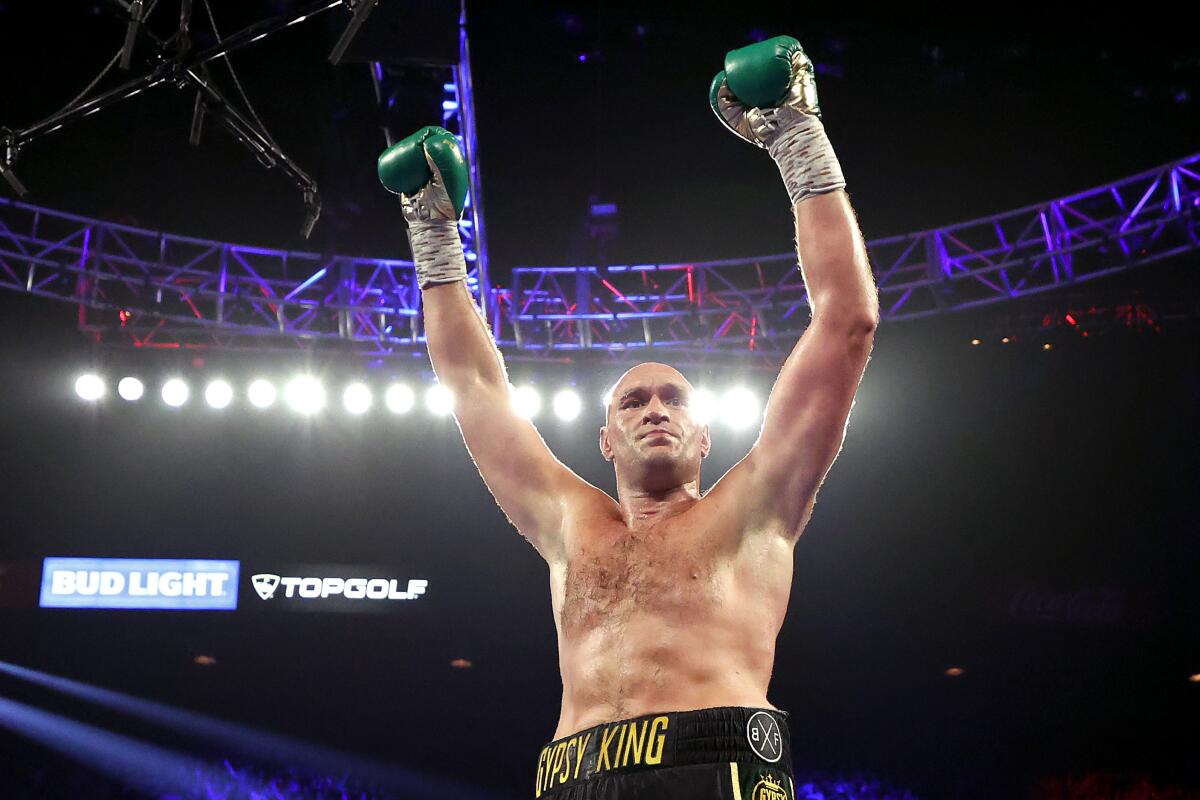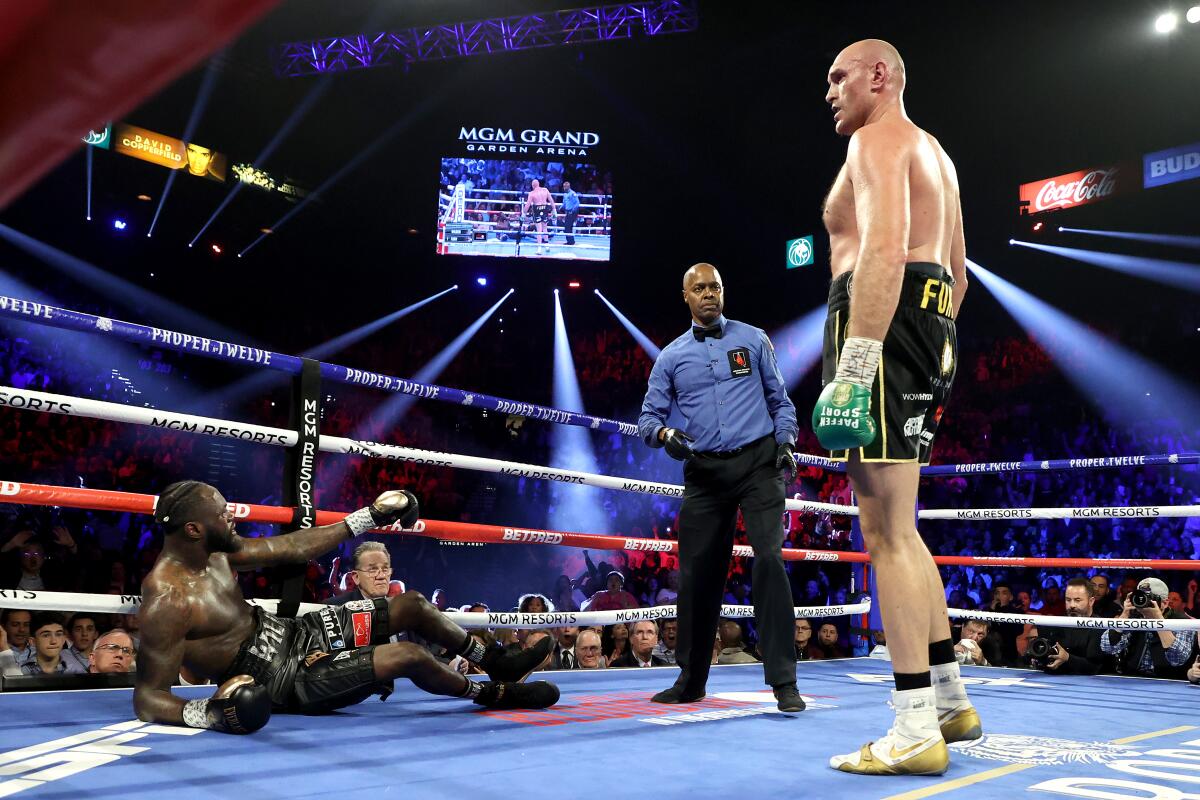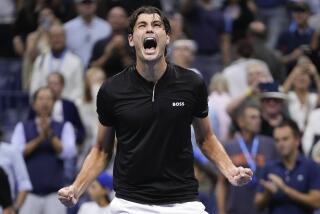Furious Tyson Fury gives Deontay Wilder a licking

LAS VEGAS — Tyson Fury came into the ring to “Crazy,” Patsy Cline’s country classic.
It’s an old song. But for seven rounds Saturday night, it was a modern hit. It said it all.
Crazy happened in Fury’s stunning seventh-round stoppage of Deontay Wilder in a heavyweight rematch before a sold-out crowd of 15,816 at the MGM Grand. Fury delivered the domination of Wilder that he promised, knocking him down twice, in the third round and again in the fifth, in handing the World Boxing Council champion his first loss.
Fury (30-0-1, 21 knockouts), who weighed in more than 40 pounds heavier than Wilder (42-1-1), was in charge from the outset. In the third, Fury moved forward, throwing big shots that narrowly missed just as Wilder ducked. It was a dangerous game. It was risky. But the risk paid off. Fury floored Wilder with glancing left and right shots off the back of his head. The crowd, predominantly Fury fans from his native England, roared.
In the fifth, Wilder was down again, this time from a left to the body. Fury was having his way, making Wilder look more like an amateur than a defending champion. Fury fans didn’t have to sing “God Save the Queen.” It looked as if nothing could save Wilder.
In the sixth, blood began pouring from Wilder’s left ear. Fury licked the blood off Wilder’s neck during a clinch, like a predator sensing that his prey was finished. He was. In the seventh, Wilder’s corner threw in the towel, ending it at 1:39 of the round.
At the time of the stoppage, Fury had won every round on two cards. It was a shutout, according to judges Dave Moretti and Steve Weisfeld. On Glenn Feldman’s card, Wilder won only one round, the second.
What transpired, however, was never in the cards.
It was as one-sided as their first fight was close. In that December 2018 bout at Staples Center, Wilder knocked down Fury twice, including a 12th-round combination that put the “Gypsy King” down hard. But Fury recovered and earned a draw.
Tyson Fury dominates against Deontay Wilder, forcing Wilder’s team to throw in the towel during the seventh round.
This marks an even greater comeback for Fury, who adds Wilder’s WBC belt to his lineal title and now can turn his attention to regaining the other heavyweight belts, which he won by beating Wladimir Klitschko in 2015 but lost when the fame led his life to spiral out of control.
Saturday’s fight started fast. Wilder wasted little time in unleashing his feared right hand, landing two moments after the opening bell. Fury countered, backing him up with jab and a right.
Then, there was the second, the round in which Fury boldly promised to knock out Wilder. Fury wasn’t kidding. He went after Wilder, rocking him with a succession of blows in the losing seconds. But there was no knockout. Fury’s promise went unfulfilled. But a promise for more a lot more fury was evident.
In the third, Fury began. It was little late, maybe. But Wilder went down and looked confused. He slipped. He got up, unsure of what was next.
In the fourth he slipped again. Wilder’s feet were all over the place. He looked like a kid on roller skates for the first time. Fury leaned on him, his 273-pound body looking like a burden made to weaken Wilder.
Then, there was the fifth. The end was near. The second knockdown made it just a matter of minutes.
“A big shout out to Deontay Wilder,” Fury said before he serenaded his fans like a singer in a Vegas show club. “He came here tonight and he manned up and he really did show the heart of a champion. I hit him with a clean right that dropped him and he got back up. He is a warrior. He will be back. He will be champion again.
“But I will say, the King has returned to the top of the throne.”

Fury arrived on a throne. He was carried into the ring like a modern-day Caesar. He wore a royal red robe and crown.
Wilder left frustrated. He was angry that his corner had thrown in the towel.
“The best man won tonight,” Wilder said. “But my corner threw in the towel and I was ready to go out on my shield. I had a lot of things going on heading into this fight.
“It is what it is, but I make no excuses tonight. I just wish my corner would have let me go out on my shield. I’m a warrior. He had a great performance and we will be back stronger.”
Crazy.
Earlier on the pay-per-view card, Charles Martin, a former International Boxing Federation heavyweight champion from Carson, got closer to a chance at regaining the title he lost in a second-round stoppage to Anthony Joshua in April 2016. He stopped Gerald Washington, a former USC football player, in a so-called elimination bout, putting him second behind Kubrat Pulev for a mandatory shot at Joshua.
Washington struck first, landing a straight right, seconds after the opening bell. But the left-hander Martin responded quickly, countering with hands as quick as they are heavy. He backed Washington into the ropes with a succession of shot that might have been an early warning of what was to come.
Martin (28-2-1, 25 KOs) rocked Washington with a left in the fourth, the round that Martin promised a knockout. There was no KO. But there some momentum, all in favor of Martin.
His left started to zero in, landing three more times in the fifth. Washington (20-4-1, 13 KOs) looked stiff. His ponderous jab had no effect. He waved it in front of Martin’s face. But it was more of a gesture than a weapon.
In the sixth, Martin simply threw another left, this time over the stationary jab. It landed like a bomb, exploding at impact into the face of Washington. Boom, Washington went down like a concrete block. There was no getting up. Referee Tony Weeks ended it at 1:57 of the round.
In the second bout on the pay-per-view card, a victorious Emanuel Navarrete quickly discovered he was in for a longer night than he might have expected.
Navarrete is known for slow starts. Sure enough, the World Boxing Organization’s junior-featherweight champion was cautious in the first and second rounds against Jeo Santisima, an unknown Filipino.
In the third, however, Navarrete (31-1, 27 KOs) mounted his familiar whirlwind-like charge. Santisima was ready for it, moving laterally and away from Navarrete’s straight-line pursuit. In the fifth, Santisima backed Navarrete back into the ropes with a right hand.
Navarrete, who said he injured his right thumb, is known for his busy style. For much of the bout, however, Santisima was the busier fighter. It wasn’t until the 10th that Navarrete began to use his length and energy, throwing punches at a rate that began to slow Santisima (19-3, 16 KOs).
In the 11th, the Filipino looked exhausted. His corner saw the fatigue, throwing in the towel just as Santisima appeared defenseless at 2:20 of the round.
“The fight did take a long time,” said Navarrete, who hopes to unify the 122-pound title before moving up the scale to featherweight. “That’s because I was in against a very good fighter.”
Best of undercard
It was 10 rounds of punishment. First, Petros Ananyan suffered. Then, Subriel Matias. It was about who could endure.
In the end, Ananyan endured blood, bruises and Matias.
Ananyan, of Brooklyn, N.Y., got rocked early, yet came back in the seventh round with four successive rights and a left, sending a dazed Matias backpedaling into the ropes. Without those ropes, the previously unbeaten Matias would have landed in the ringside seats.
It was scored a knockdown and it was enough for Ananyan (15-2-2, 7 KOs) to win a 95-94, 96-93, 95-94 decision in a significant upset. Matias (15-1, 15 KOs), a junior-welterweight prospect from Puerto Rico, was fighting for only the second time since Maxim Dadashev died three days after suffering a brain injury in a loss to him last July in Oxon Hill, Md.
More to Read
Go beyond the scoreboard
Get the latest on L.A.'s teams in the daily Sports Report newsletter.
You may occasionally receive promotional content from the Los Angeles Times.










